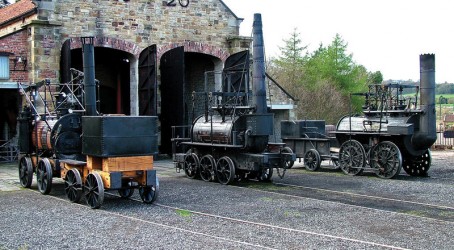Museums
As the North East of England punched above its weight in terms of its contribution to Britain’s frantic pace of industrialisation during the 19th and 20th centuries, it’s fitting that there is a fine museum to reflect its noteworthy achievements.
What Beamish open-air museum in County Durham does particularly well is offer an insight into the lives of everyday people in the region across that time. It was often an existence of hardship and struggle, laced with tragedy due to the danger involved in jobs such as coal-mining. But there was also a real sense of pride and community.
Beamish is less a museum and more of a mock-town. It is laid out over 300 acres and comes complete with its own transport system, courtesy of vintage trams and buses. There are several distinct areas to wander around: the Edwardian Town comprises houses, shops and other buildings rebuilt and furnished as they once were, while the Pit Village, centred around a typical colliery as it would have been in the early 1900s, depicts the cramped living conditions of miners and their families. Most of the guides at Beamish don authentic costumes and are “in character” to portray the feel of Georgian, Victorian and Edwardian times, and the vast majority of exhibits are shown in their original contexts, not stuck in dusty old display cases.
Technological advancements get a deserved look-in. Visitors are allowed to descend into Beamish’s very own drift mine, which was worked for more than a century, but can do so only after listening to an informative run-through of the development of the miner’s lamp.
At the pit head, meanwhile, there’s a superb example of a colliery winding engine – the sole survivor of a type once common among the northern coalfields. The Chop Hill single-cylinder vertical winding engine, dated 1855, was in use at the Beamish pit until 1962. It is a monster of a machine which can be seen working for much of the year.
In the adjacent engine shed are several industrial steam locomotives from the 1870s that have been restored to their former glory. There are also a couple of 2ft-gauge unrestored locos – Glyder and Ogwen – which have been repatriated after half a century in the US. The locomotives both originally worked the huge Penrhyn slate quarry in North Wales before being shipped to Indiana where the plan was to display them at a proposed steam museum. This venture never got off the ground, and the locos were abandoned in a barn. Now they are at Beamish where money is being raised to restore them.
Other parts of the museum offer quirky examples of technology. In the hardware store in the Town, where numerous mangles, irons and sewing machines are on display, there is a gravity-driven Lamson Paragon cash carrying system. This was used to transport money from the shop to the office and can be operated on request.
Over the road in the print shop, knowledgeable guides can talk at length about the development of mechanical composition, while the garage contains a pristine Ford Model T and a 1913 Renault.
Beamish Railway Station is typical of the period. A wrought-iron footbridge crosses the tracks and leads to the signal box, dating from 1896. In the goods yard is a shed, dating from 1850, containing a variety of wagons. Also, from time to time, visiting steam locomotives appear at the station.
Beamish provides easily enough entertainment to fill a full day. It is an evocative representation of life in the North East during industrialisation, and provides a perfect balance between social history and technical advances. It’s a real delight and highly recommended.

5 things to see
Beamish transport system
Admire the six beautifully restored working trams.
The printer’s workshop and stationery shop
See how the amazing Columbia printing press works.
Drift mine
Take a guided tour underground to see how coal was extracted.
The motor and cycle works
Ask the proprietor about the fascinating story of the Armstrong Whitworth car.
The Sun Inn
Enjoy a pint of real ale beside a cosy coal fire.
- Beamish Museum is open seven days a week, 10am to 5pm. Adults £17.50, children £10. More details at www.beamish.org.uk